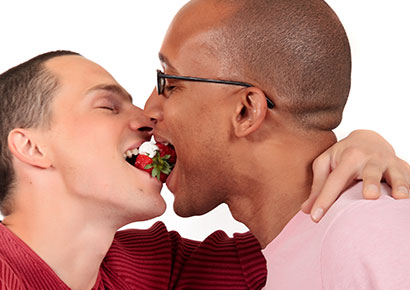What’s love got to do with it?
 Love makes the world go round, they say. We all feel it, hope for it and often miss it deeply when it’s gone. Here are ten things you probably never knew about love…
Love makes the world go round, they say. We all feel it, hope for it and often miss it deeply when it’s gone. Here are ten things you probably never knew about love…
1: Love is diverse and gay.
Contrary to what bigots claim, love is not ‘naturally’ heterosexual. Homosexuality has been found in all cultures and societies throughout human history. It’s also found in the animal kingdom; in fact, same-sex sexual behaviour has been documented in over 1,500 species. And they don’t necessarily just “get it on”; there are accounts of same-sex animal pairings being ongoing partnerships and, in the case of some penguin couples, may even include the nurturing of eggs and chicks.
2: A broken heart is not just a metaphor.
We often describe the feeling of losing a great love to a break up, circumstance or death as “heartbreak”. And it’s not just an emotional experience that poets and singers write and croon about – scientists actually call the phenomenon “Broken Heart Syndrome”, which is known to affect your heart. Heartbreak can lead to a physical reaction in the old ticker, such as chest pain, that can feel similar to a heart attack. Thankfully it’s believed to very rarely be long-lasting or deadly (but that’s not unheard of).
3: Valentine’s Day’s is based on a (probably) real person.
It’s claimed that the day, also known as the Feast of Saint Valentine, is named after the 3rd-century Roman saint, Valentinus. He went against the orders of Emperor Claudius II who barred soldiers from tying the knot during wartime. Valentinus continued to secretly marry smitten warriors and was jailed and executed after his treasonous acts were discovered. He was reputedly buried on February 14th and over the centuries the day became associated with a celebration of romantic love. (Little did Valentinus know that it would also become a massive commercial opportunity and fortunes would be made in his name.)
4: Falling in love is a natural chemical high.
People have often said that love is like a drug; you just can’t get enough – and they’re not wrong! Researchers have found that falling in love simultaneously releases a range of chemicals – like vasopression, adrenaline, oxytocin and dopamine – in 12 areas of the brain. They all contribute to making us feel elated. Scientists say that the feeling is very similar to the effect of taking cocaine – without any of the potential health risks, of course.
 5: Are we meant to be with one partner or many?
5: Are we meant to be with one partner or many?
We assume that it’s a wild free for all in the animal kingdom. And indeed, while multiple partners are the order of the day for the vast majority of species, there are also examples of monogamy in nature. This is seen in the likes of bald eagles, swans, penguins, wolves, gibbons, ducks, foxes, mountain lions, eagles and others – that pair up with one partner – sometimes for life. Luckily, as human beings we increasingly have the freedom to choose how and who we want to love.
6: Love can take away physical pain.
Research has shown that when you embrace or hug someone significant, your body produces the hormone Oxytocin. This chemical can reduce pain, such as headaches, and even take them away completely. Interestingly, other studies have also found that holding hands with a partner or even just looking at a picture of a loved one can help people who are experiencing pain.
7: Could opposites be the secret to longer lasting love?
We’ve all heard that “opposites attract” but when it comes to long-term love the truth seems to be somewhere in the middle. Psychologists have found that people that have the strongest and happiest relationships tend to be with partners who share some personality traits, values and other aspects, but not too much or too many. It seems that it’s a matter of extremes: Too similar or too opposite from each other may not be ideal, but a couple sitting somewhere in-between is likely to be a better match.
8: Love is a word for many feelings that can be experienced at the same time.
The ancient Greeks, for example, believed that there are seven different types of love, and had a word for each one: There’s Storge: the love you share with your family; Philia: the love for friends; Eros: sexual and erotic desire; Agape: unconditional or divine love; Ludus: playful or childlike love (such as flirting); Pragma: the love shared by a long-time couple; and Philautia: love for oneself.
9: You can fall in love with someone in mere minutes.
According to psychologists, you usually fall for someone you meet for the first time within 90 seconds and 4 minutes. It’s not what we say that really counts – but what our other senses tell us. Researchers found that the most important way that we find someone else attractive or appealing is primarily through their body language (55%) and the tone and speed of their voice (38%). What the person actually says only accounts for 7% of why we may find them attractive. Of course, it may be a stretch to call this falling in love in 4 minutes. Perhaps, falling in lust is more accurate?
 10: Yes, love is blind.
10: Yes, love is blind.
It’s been shown – at least in the beginning stages of love – that we tend to not notice the faults and flaws of our partners. Instead we often amplify the good and see them as amazing and filled with appealing traits, even when these are things that might otherwise turn us off. It’s probably a useful phenomenon that allows us to develop a strong bond with someone before we become acutely aware of their annoying habits and imperfections. Without this ‘love blindness’, we might never find anyone to pair up with!
However, wherever and whenever you find love, it’s important to also respect and take care of yourself. For many gay, bi and other men who have sex with men, PrEP – a daily bill that protects you from HIV – is a smart option. You can get it free from TEN81 in Pretoria (066 190 5812), the Ivan Toms Centre for Men’s Health in Cape Town (021 447 2844) and Health4Men at Yeoville clinic in Johannesburg (011 648 7979 or 072 654 0816).
Leave a Reply